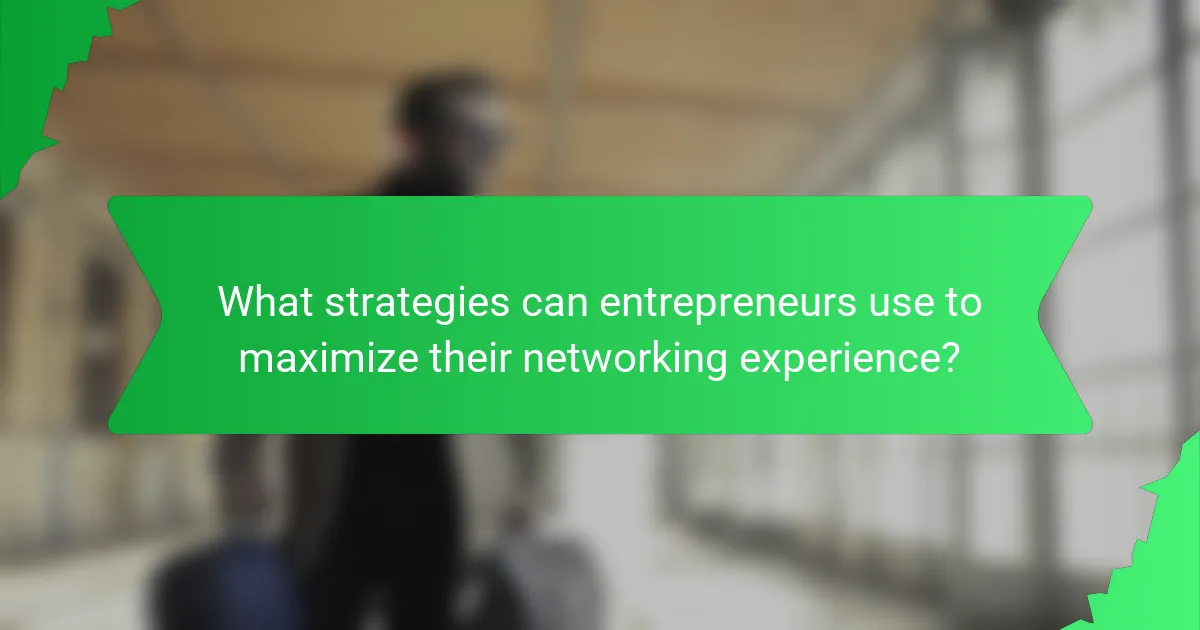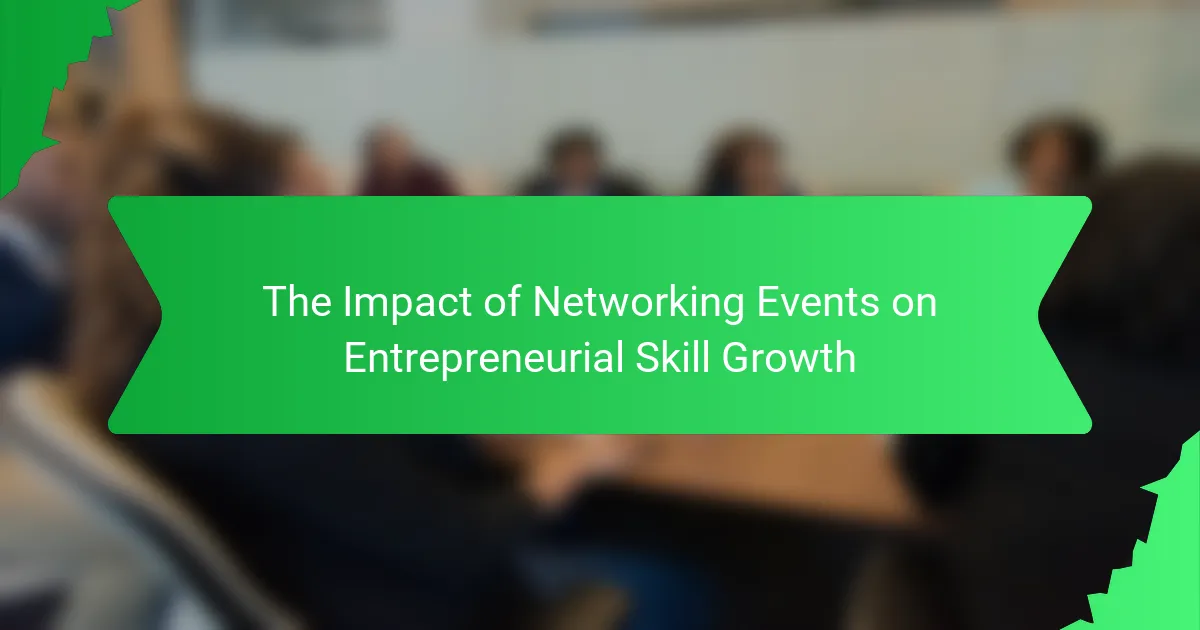Networking events play a crucial role in enhancing entrepreneurial skill growth by providing opportunities for entrepreneurs to connect with peers, mentors, and industry experts. These events facilitate knowledge sharing, collaboration, and access to best practices and innovative strategies. Research indicates that a significant percentage of entrepreneurs attribute their business success to networking, highlighting its importance in personal and professional development. Various types of networking events, including industry conferences, workshops, and meetups, offer targeted skill development and foster valuable connections. Entrepreneurs can optimize their networking experiences by setting clear goals, engaging in meaningful conversations, and following up to strengthen relationships.

What is the impact of networking events on entrepreneurial skill growth?
Networking events significantly enhance entrepreneurial skill growth. They provide opportunities for entrepreneurs to connect with peers, mentors, and industry experts. This interaction fosters knowledge sharing and collaboration. Entrepreneurs can gain insights into best practices and innovative strategies. Additionally, networking events often include workshops and seminars that focus on skill development. Research shows that 70% of entrepreneurs credit networking as crucial for their business success. Engaging with a diverse group helps entrepreneurs broaden their perspectives. As a result, networking events are vital for personal and professional development in entrepreneurship.
How do networking events influence the development of entrepreneurial skills?
Networking events significantly enhance the development of entrepreneurial skills. They provide opportunities for entrepreneurs to meet industry experts and peers. This interaction fosters knowledge exchange and idea generation. Networking events often feature workshops and panel discussions. These sessions teach practical skills and strategies relevant to entrepreneurship. According to a study published in the Journal of Business Venturing, 68% of entrepreneurs reported improved skills after attending networking events. Additionally, these events facilitate mentorship opportunities. Mentorship is crucial for skill development, as experienced entrepreneurs share valuable insights. Overall, networking events create an environment conducive to learning and growth in entrepreneurial skills.
What specific skills can be enhanced through networking events?
Networking events can enhance several specific skills. These include communication skills, which improve through engaging conversations. Attendees practice active listening and articulate their ideas effectively. Networking also enhances interpersonal skills, as participants build relationships with diverse individuals. Problem-solving skills are developed through discussions about challenges and solutions. Additionally, networking fosters negotiation skills by providing opportunities to practice and refine these techniques. Leadership skills can be enhanced as individuals take initiative in group settings. Research shows that 70% of professionals attribute their job opportunities to networking, highlighting its importance in skill growth.
How do networking events foster collaboration among entrepreneurs?
Networking events foster collaboration among entrepreneurs by creating opportunities for interaction. These gatherings allow entrepreneurs to meet peers and share ideas. They facilitate knowledge exchange, which can lead to innovative solutions. Entrepreneurs can form partnerships during these events. Statistics show that 70% of entrepreneurs believe networking is vital for business growth. Additionally, networking events often include workshops and discussions that enhance skills. This collaborative environment encourages problem-solving and resource sharing. Overall, networking events play a crucial role in fostering entrepreneurial collaboration.
Why are networking events important for entrepreneurs?
Networking events are important for entrepreneurs because they facilitate valuable connections. These events provide opportunities to meet potential clients, partners, and investors. Entrepreneurs can share ideas and gain insights from others in their industry.
Research shows that 85% of jobs are filled through networking. This statistic highlights the significance of relationships in business success. Networking events also enhance visibility and credibility within the entrepreneurial community.
Additionally, these gatherings often feature speakers and workshops that foster skill development. Entrepreneurs can learn about trends, strategies, and best practices. Overall, networking events are essential for growth and opportunity in entrepreneurship.
What are the key benefits of attending networking events?
Attending networking events offers significant benefits for personal and professional development. These events facilitate connections with industry professionals and potential collaborators. Participants can gain insights into market trends and best practices. Networking helps in building a personal brand and increasing visibility in the industry.
Statistics show that 85% of jobs are filled through networking, highlighting its importance in career advancement. Networking events also provide opportunities for mentorship and guidance from experienced professionals. Engaging in these environments fosters the exchange of ideas and innovation.
Moreover, networking can lead to partnerships that drive business growth. According to a survey by LinkedIn, 70% of professionals believe networking is crucial for career success. These benefits collectively enhance entrepreneurial skills and open doors to new opportunities.
How do networking events contribute to personal and professional growth?
Networking events enhance personal and professional growth by facilitating connections and knowledge exchange. They provide opportunities to meet industry leaders and peers. Participants can gain insights into market trends and best practices. Networking fosters collaboration and mentorship relationships. Studies show that 70% of jobs are found through networking. This statistic highlights the importance of connections in career advancement. Additionally, networking events can boost confidence and communication skills. Engaging with diverse individuals broadens perspectives and encourages innovation. Overall, these events are essential for developing a robust professional network and enhancing entrepreneurial skills.

What types of networking events are beneficial for entrepreneurs?
Networking events that are beneficial for entrepreneurs include industry conferences, workshops, and meetups. Industry conferences provide opportunities to connect with key players and gain insights into market trends. Workshops focus on skill development and often feature expert speakers. Meetups foster informal networking and collaboration among local entrepreneurs. These events facilitate knowledge sharing and mentorship opportunities. According to a study by the Kauffman Foundation, networking events significantly enhance entrepreneurial success rates. Entrepreneurs who actively participate in such events report increased access to resources and partnerships.
How do formal networking events differ from informal ones?
Formal networking events are structured and often have specific goals. They typically include scheduled activities, presentations, and a set agenda. Participants usually dress in professional attire and engage in planned interactions. In contrast, informal networking events are casual and spontaneous. These gatherings may occur in social settings without a formal agenda. Attendees often dress casually and engage in relaxed conversations. Research shows that formal events can lead to more targeted connections, while informal events foster organic relationship building. Both types contribute to entrepreneurial skill growth through different networking dynamics.
What are the characteristics of effective formal networking events?
Effective formal networking events are characterized by structured agendas, targeted participant lists, and conducive environments. Structured agendas ensure that time is allocated for meaningful interactions. Targeted participant lists include individuals with relevant expertise and interests, fostering valuable connections. Conducive environments provide comfort and accessibility, encouraging open communication.
Additionally, effective events incorporate ice-breaking activities to facilitate introductions. They also offer opportunities for follow-up interactions, such as post-event meetups or online groups. Research indicates that events with clear objectives yield higher satisfaction rates among attendees. For instance, a study by the Harvard Business Review found that networking events with defined goals increase the likelihood of successful partnerships.
How can informal networking opportunities be leveraged for skill growth?
Informal networking opportunities can be leveraged for skill growth by facilitating knowledge exchange and collaboration. Engaging with peers in relaxed settings encourages open discussions about industry trends and best practices. These interactions often lead to mentorship relationships that can provide personalized guidance. Networking events allow individuals to share experiences, which can highlight different approaches to problem-solving.
Research indicates that 70% of jobs are found through networking, demonstrating its importance in career advancement. Participating in informal gatherings can also expose individuals to diverse perspectives, enhancing critical thinking skills. Additionally, informal settings often foster creativity, as participants feel more comfortable sharing innovative ideas.
Ultimately, leveraging informal networking can significantly contribute to an individual’s professional development and skill enhancement.
What role do industry-specific networking events play in skill development?
Industry-specific networking events play a crucial role in skill development. These events provide opportunities for individuals to connect with industry professionals. Networking fosters the exchange of knowledge and best practices. Participants can learn about current trends and innovations directly from experts. Engaging in discussions helps attendees refine their ideas and approaches. Additionally, these events often feature workshops and seminars that enhance practical skills. Research indicates that 70% of professionals attribute their career advancements to networking. This demonstrates the significant impact such events have on professional growth.
How do specialized networking events cater to unique entrepreneurial needs?
Specialized networking events cater to unique entrepreneurial needs by providing tailored environments for specific industries or interests. These events often focus on particular sectors, such as technology, healthcare, or sustainability. This focus allows entrepreneurs to connect with like-minded individuals facing similar challenges.
Additionally, specialized events often feature expert speakers who address relevant topics. This provides attendees with insights directly applicable to their entrepreneurial ventures. Networking opportunities at these events are designed to foster collaboration and partnerships. Entrepreneurs can find mentors, investors, or collaborators who understand their niche.
Furthermore, attendees benefit from workshops and interactive sessions. These sessions are crafted to enhance specific skills pertinent to the industry. Research shows that targeted networking can lead to more meaningful connections and opportunities. A study by the Kauffman Foundation highlights that specialized networking increases the likelihood of business growth by 30%.
Overall, specialized networking events are structured to meet the distinct needs of entrepreneurs, facilitating valuable connections and skill development.
What are the advantages of attending niche-focused networking events?
Attending niche-focused networking events offers specific advantages for entrepreneurs. These events provide targeted opportunities to connect with like-minded individuals. Participants can share industry-specific knowledge and insights. This exchange fosters collaboration and innovation. Networking in a niche setting often leads to meaningful relationships. Such connections can result in partnerships or mentorships. Statistics show that 85% of jobs are filled through networking, highlighting its importance. Additionally, niche events often feature expert speakers, enhancing learning opportunities. These advantages collectively contribute to entrepreneurial skill growth.

What strategies can entrepreneurs use to maximize their networking experience?
Entrepreneurs can maximize their networking experience by setting clear goals before attending events. Having specific objectives helps focus interactions. They should research attendees and speakers in advance. This preparation allows for targeted conversations. Actively engaging in discussions enhances visibility and connection. Following up after events solidifies relationships. Sending personalized messages shows genuine interest. Joining relevant groups or associations extends networking opportunities. This approach fosters ongoing connections beyond single events. According to a 2021 study by the Harvard Business Review, effective networking can lead to a 50% increase in business opportunities.
How can entrepreneurs prepare for networking events effectively?
Entrepreneurs can prepare for networking events effectively by setting clear goals. They should identify specific outcomes they want to achieve, such as meeting potential clients or partners. Researching attendees and speakers is crucial. This allows entrepreneurs to tailor their conversations and questions. Practicing an elevator pitch helps in communicating their value succinctly. Bringing business cards ensures they can share contact information easily. Dressing appropriately for the event sets a professional tone. Finally, following up with new contacts solidifies connections made during the event. These strategies enhance networking effectiveness and promote entrepreneurial skill growth.
What are the best practices for initiating conversations at networking events?
To initiate conversations at networking events, approach individuals with confidence. Start with a friendly greeting and introduce yourself. Use open-ended questions to encourage dialogue. For example, ask about their interests or experiences related to the event. Active listening is crucial; it shows genuine interest. Maintain eye contact and nod to acknowledge their responses. Be aware of body language; it conveys openness. Sharing relevant personal stories can create a connection. Following up with a business card or LinkedIn request solidifies the interaction. Research indicates that effective networking enhances entrepreneurial skills, fostering valuable connections and opportunities.
How can follow-up strategies enhance connections made at networking events?
Follow-up strategies enhance connections made at networking events by reinforcing relationships and facilitating ongoing communication. These strategies include sending personalized emails or messages to express appreciation for the conversation. They can also involve sharing relevant resources or insights discussed during the event. Research shows that 80% of professionals believe that follow-ups are crucial for building lasting relationships. Regular follow-ups can lead to collaborative opportunities, referrals, and partnerships. Additionally, maintaining contact helps keep the connection fresh and relevant. This proactive approach demonstrates professionalism and commitment. Ultimately, effective follow-up strategies can significantly increase the value derived from networking events.
What common challenges do entrepreneurs face at networking events?
Entrepreneurs face several common challenges at networking events. One challenge is overcoming social anxiety. Many entrepreneurs feel nervous when meeting new people. This can hinder their ability to make connections. Another challenge is effectively communicating their value proposition. Entrepreneurs often struggle to articulate their business ideas clearly. Time management is also an issue. With limited time, entrepreneurs may find it difficult to engage with multiple contacts. Additionally, entrepreneurs may face difficulties in identifying relevant connections. Not all attendees will align with their business goals. Lastly, following up after the event can be a challenge. Many entrepreneurs forget to maintain the relationships they establish. These challenges can impact their networking effectiveness and overall business growth.
How can entrepreneurs overcome shyness or anxiety in networking settings?
Entrepreneurs can overcome shyness or anxiety in networking settings by preparing in advance. Preparation includes researching attendees and planning conversation topics. Practicing introductions can build confidence. Setting small goals, like initiating one conversation, can make networking manageable. Engaging in active listening helps reduce pressure to speak. Utilizing body language, such as maintaining eye contact, fosters connection. Gradually increasing networking exposure can desensitize anxiety. A study by the American Psychological Association shows that practice reduces anxiety in social situations.
What strategies can help entrepreneurs navigate difficult networking situations?
Entrepreneurs can navigate difficult networking situations by employing strategies such as active listening and preparation. Active listening allows entrepreneurs to engage meaningfully with others. This builds rapport and trust, essential for effective networking. Preparation involves researching attendees and crafting tailored conversation starters. This approach increases confidence and reduces anxiety in networking scenarios.
Additionally, entrepreneurs should adopt a positive mindset. A positive attitude can enhance interactions and create a welcoming environment. Practicing small talk can also ease initial awkwardness. This skill allows entrepreneurs to connect with others more naturally.
Moreover, following up after an event is crucial. Sending personalized messages reinforces connections made during networking. This can lead to future collaborations and opportunities. Overall, these strategies empower entrepreneurs to navigate challenging networking situations effectively.
What are the best tips for leveraging networking events for skill growth?
Engaging actively at networking events is essential for skill growth. Start by setting clear objectives for what skills you want to develop. This focus helps guide your interactions. Approach others with genuine curiosity about their experiences and insights. Asking questions encourages knowledge sharing and fosters connections. Attend workshops or sessions within the event to gain specific skills directly. These sessions often feature industry experts who provide valuable insights. Follow up with new contacts after the event to build relationships and exchange ideas. Research shows that networking can significantly enhance career advancement and skill acquisition. A study by LinkedIn found that 85% of jobs are filled through networking. This statistic highlights the importance of making meaningful connections.
The primary entity of this article is networking events and their impact on entrepreneurial skill growth. Networking events significantly enhance the development of essential entrepreneurial skills by providing opportunities for knowledge exchange, collaboration, and mentorship. Key benefits include improved communication, problem-solving, and negotiation skills, as well as increased visibility and credibility within the entrepreneurial community. The article also explores various types of networking events, strategies for maximizing networking experiences, and common challenges entrepreneurs face, ultimately highlighting the critical role these events play in fostering personal and professional growth.
